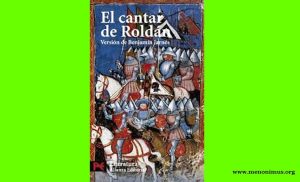La Chanson de Roland | Cantar de Roldan | A Review
La Chanson de Roland Cantar de Roldan A Review
La Chanson de Roland (Cantar de Roldan)-A Review
Introduction:
‘La Chanson de Roland,’ also known as the ‘Cantar de Roldán,’ is a remarkable literary work that transcends cultural boundaries, intertwining elements of both French and Spanish traditions. This Old Spanish epic poem draws its inspiration from the French ‘Chanson de Roland,’ and it delves into the historical event of the Battle of Roncevaux. This review aims to delve into the key aspects of ‘La Chanson de Roland,’ examining its structure, themes, cultural significance, and enduring appeal.
Historical Context and Cultural Significance:
‘La Chanson de Roland’ is rooted in the historical backdrop of the Battle of Roncevaux, a pivotal event in the Charlemagne’s campaigns in Spain. This battle, fought between the Frankish army and Basque forces in 778 AD, serves as the foundation for the narrative. The poem’s cultural significance lies in its ability to merge the French and Spanish literary traditions, showcasing the interconnectedness of medieval Europe. This fusion highlights the fluidity of cultural exchange during that era and serves as a testament to the enduring power of storytelling to transcend borders.
Narrative Structure:
The poem is structured in the form of a chanson de geste, a narrative form popular in medieval Europe. It comprises of approximately 4,000 lines written in Old Spanish, utilizing a rhymed verse pattern. The narrative follows the struggles of the protagonist, Roland, a valiant knight and nephew of Charlemagne, against the Saracen forces led by Marsile. The narrative is replete with epic battles, heroic deeds, and grandiose speeches, typical of the chanson de geste style.
Themes and Motifs:
Heroism and Honor: Central to the poem is the theme of heroism and honor. Roland’s unwavering courage and dedication to his duty are portrayed as heroic virtues, and his tragic death in the battle becomes a symbol of self-sacrifice for a greater cause.
Betrayal and Loyalty: The poem also explores themes of betrayal and loyalty. Roland’s tragic fate is sealed by the treachery of Ganelon, who betrays him out of jealousy, highlighting the conflict between personal ambition and loyalty to the realm.
Religious Undertones: ‘La Chanson de Roland’ incorporates religious motifs, portraying the conflict as a holy war against the Saracen forces. The religious fervor adds depth to the narrative and underscores the divine dimensions of the battles.
Characterization:
The characters in ‘La Chanson de Roland’ are emblematic of the values and ideals of the medieval world. Roland embodies chivalry, bravery, and devotion to his lord, Charlemagne. Charlemagne himself stands as the ideal king, just and powerful. Ganelon represents treachery, while Marsile and Baligant symbolize the enemies of Christianity. The characters’ traits serve as a reflection of the moral landscape of the time.
Language and Style:
The use of Old Spanish in ‘La Chanson de Roland’ contributes to its linguistic significance. The poem showcases the evolution of the Spanish language and provides insights into the linguistic nuances of the period. The rhythmic and rhymed verse adds a musical quality to the text, enhancing its oral performance.
Conclusion:
‘La Chanson de Roland’ (Cantar de Roldán) stands as a testament to the power of storytelling in bridging cultures and epochs. Through its fusion of French and Spanish traditions, the poem exemplifies the cultural exchanges that shaped medieval Europe. Its exploration of heroism, loyalty, and religious fervor, coupled with its linguistic and stylistic merits, cements its enduring place in literary history. As a cross-cultural epic, it continues to captivate readers and scholars alike, inviting them to explore the layers of history and human nature embedded within its verses. 0 0 0.
La Chanson de Roland Cantar de Roldan A Review
N.B. The article originally belongs to the book entitled ‘The Reviews of Epic Literature Around the World‘ by Menonim Menonimus.
You May Like:








